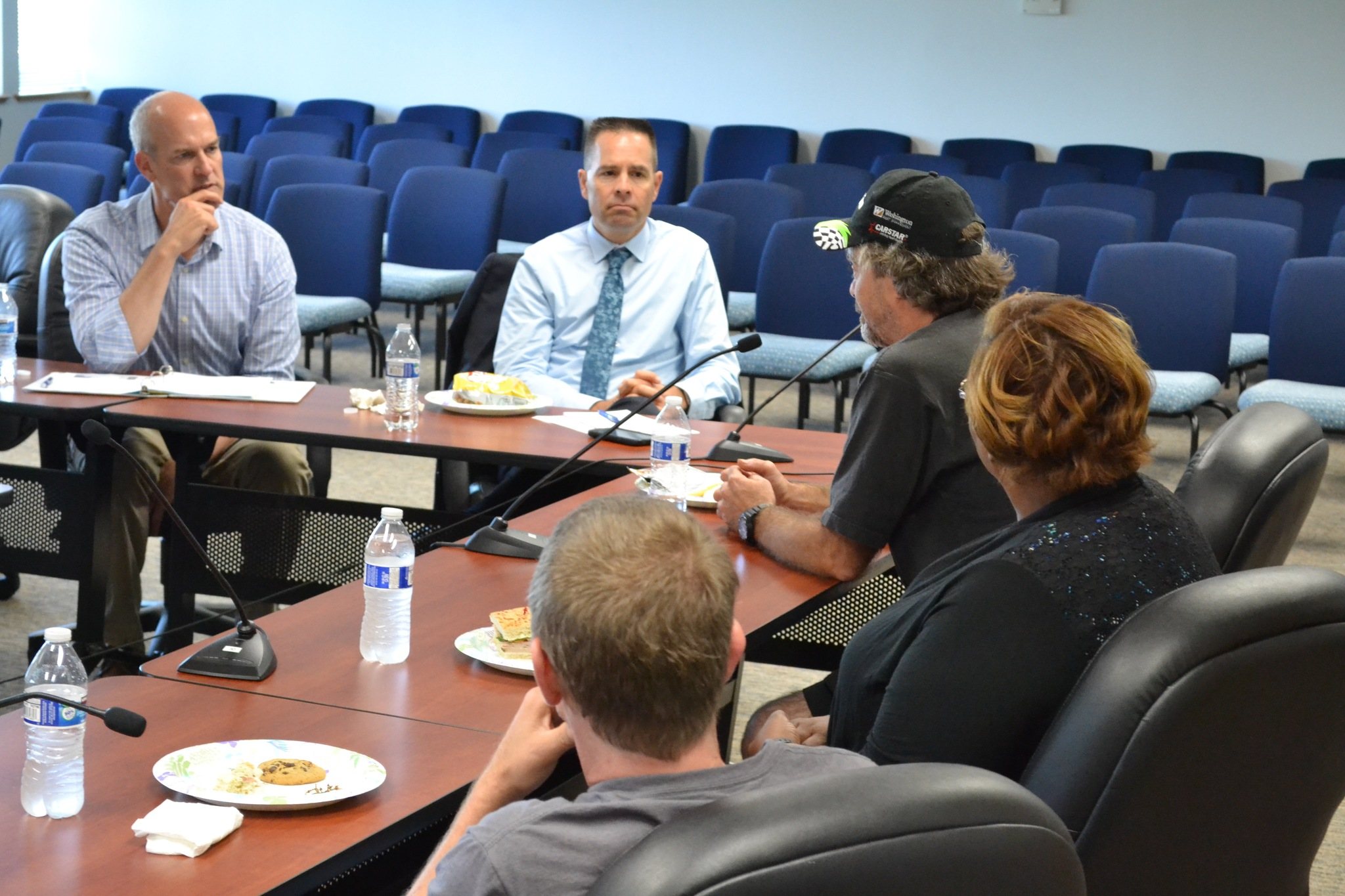MARYSVILLE – It may be transitional housing, but to Pete it’s home.
“We’ve got the nicest-looking yard around,” he said proudly. “It’s my way of showing I’ll take care of the place. I’ll call it mine even though I know” someday it will be torn down in favor of a new road.
Pete was talking to U.S. Rep. Rick Larsen, D-WA, Mayor Jon Nehring and other community leaders Aug. 29. Pete has been living for months on Third Street in Marysville’s first transitional housing for men.
The effort between the city, Everett Gospel Mission and the Marysville faith community is going so well that Nehring said in September the council will be looking at using other city-owned homes for similar uses.
“We want to be good neighbors,” Nehring said, adding the city’s vision is to help and provide resources for people down on their luck.
The city buys homes for upcoming transportation projects and usually rents them out until needed. But this way it can help the homeless get on a positive pathway in life.
Pete added: “We have all the tools we need to succeed,” adding if more homes are available, “you’ll have a lot more successes.”
Dan Hazen, pastor at Allen Creek Community Church, asked Larsen if he had connections with banks that own “zombie houses” that instead of sitting empty could be used for housing homeless. Homes abandoned during the recession have been given that nickname.
Larsen said he would look into that. He blamed the homeless as a hangover of the 2008 recession.
“People fell off and stayed off,” he said. “They’re more visible.”
Larsen has done a lot with the homeless over the years.
“Some want help, others refuse it,” he said. “You’re doing it right because you keep asking.”
Mike Perry, who along with his wife, Trina, oversees the transitional housing, said it works because they give the three men love and respect.
“We’re not babysitting,” Perry said he told them. “You guys got this.”
He said the men had low self-esteem. Perry recalls them asking, when they were moving in, “Why are people being so nice to us? They usually don’t even act like we’re human.”
Perry said he and his wife can relate to the men because they’ve “been there, done that.” The Y helped them to turn their lives around, so they want to help others.
Perry said it’s a “miracle” that the three men get along. “They are three completely different guys,” he said, adding, “It’s just crazy enough to work.”
Pete said he does not use drugs or alcohol; he became homeless because of a work injury. Because his rent payment there is so low, he’s been able to build up his credit score.
Pete is on Labor and Industries disability and will be until he retires, he said. Another tenant works a lot of hours, but it’s minimum wage. Hazen is trying to help him find a better-paying job. And the other man Hazen wants to have volunteer at the church’s resource center to gain job skills.
Pete loves taking care of the yard. “I’m often asked, “Why are you working so hard when they are just going to tear it down?” he said. “I answer, ‘because I live there today.”
Pete said the housing made it easier after having his second back surgery three weeks prior. “I had a home environment,” he said. “I know somebody cares about us.”
Pete said shelters are good for the short-term, but some folks stay too long. “You can get institutionalized,” he said. “A lot of people get really comfortable.”
He said it takes a special person to break that cycle. “You have privacy, and you don’t know how to deal with it,” Pete said, adding some go back to using while others become reclusive.
“They have to be ready to help themselves,” he said, adding none of the three there now are troublemakers.
Larsen asked, “Where can I help?” then quickly answered himself, “First off, it’s always money.”
He said money could be better spent, and said most of it goes to treatment and more needs to go to recovery.
Larsen said he works with this issue throughout his district, from Mountlake Terrace to Bellingham. He said solutions are complex and comprehensive.
He did say the House passed last session a bill called the Comprehensive Addiction Recovery Act, and it hopes to pass some mental health reform measures this session.
He also said not all homeless use drugs or have mental health issues. He said communities are doing a better job of realizing those woes are not a moral failing so they are more willing to help.
Sylvia Anderson of the Everett Gospel Mission said there are 200 churches in Snohomish County, and it’s her goal to have each sponsor a transitional house. She said her shelter in Everett can provide emergency services for up to 100 or so men, but they need more places for longer-term recovery.
“Relationships change lives,” she said, talking about the key to getting homeless out of that cycle. “I didn’t know cities had all of these empty houses, but now that I know, look out.”
Anderson said everyone is thrilled to start working on their next house.
She said volunteers “get frustrated handing out sandwiches because they don’t see change. Long-term solutions lead to change.”
Anderson and Hazen compared shelters to being like the first grade, providing stabilization as a first step. It takes a long time for someone to reach Pete’s level.
“It’s a doctorate only he can write,” Hazen said.



